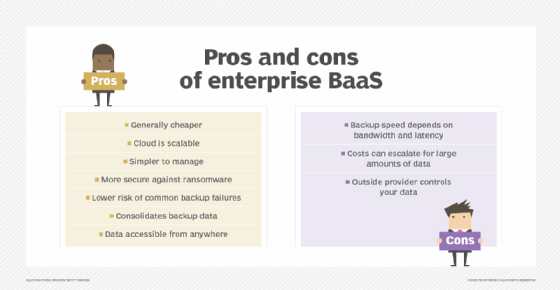9 backup as a service (BaaS) providers in 2026
BaaS is available in public, private and hybrid varieties and from numerous vendors. Here's how to evaluate the options to find a service that meets your organization's needs.
Backup-as-a-service products have long been a key component of enterprise disaster recovery efforts. Because the BaaS market has changed substantially in recent years, there might be opportunities to improve the performance, security or cost-effectiveness of your organization's backup system.
Backup as a service (BaaS) enables organizations to back up and restore data remotely using software and infrastructure managed by an external vendor. By removing the need for businesses to operate their own backup software and environments -- BaaS can simplify backup and recovery.
Read on for an overview of nine of the major BaaS providers to watch in 2026, along with details on how they compare and guidance on what BaaS means for modern organizations.
What is backup as a service (BaaS)?
According to the classic definition, BaaS is a type of data protection that makes it possible to back up and recover data using third-party software and infrastructure.
In other words, when a business chooses BaaS to meet its data and recovery needs, it doesn't have to deploy backup software on its own systems, nor does it need to ensure that it has adequate data storage infrastructure on hand for hosting backups. The BaaS provider handles all these requirements.
That said, precise definitions vary because virtually all backup and recovery software providers now market their products as BaaS -- even in cases where they provide only managed backup software and no cloud storage infrastructure to go with it. Additionally, some BaaS providers offer active assistance in restoring data following an incident. In other cases, the onus is entirely on BaaS customers to restore their systems.
As a result of these variations in usage of the term BaaS, the lines begin to blur between BaaS and related categories of cloud backup and recovery products. Remote backup, for example, involves off-site backup methods and remote infrastructure, but not necessarily using infrastructure managed by a third party. Managed backup and recovery, meanwhile, implies that the provider handles both the backup and recovery processes on behalf of customers.
At the same time, new technology trends have led to novel opportunities as well as emerging challenges in the realm of BaaS. A key change is AI. BaaS products that include AI features can help streamline some tasks. For example, generative AI could enable admins to define backup policies using natural language instead of having to configure them via traditional software tools or code.
At the same time, the need to back up AI systems and related resources, such as AI model training data, complicates backup requirements because not all BaaS products are designed to handle the data types and scale that some businesses need to protect data in the age of AI.

Types of backup as a service
Despite changes in the market, three basic types of BaaS remain:
Public. Public BaaS offerings host backup software and data in public cloud environments. They offer the benefit of virtually infinite scalability, since, practically speaking, there are no limits on how much data you can store in a public cloud. They also tend to be more reliable because public cloud data centers rarely fail.
Private. With a private BaaS product, backup tools and data are stored on private infrastructure. Typically, this is a private cloud managed by the BaaS vendor. The main advantage for customers is control, since businesses can expect to have more options regarding backup configurations than they would in a public cloud.
Hybrid. A hybrid backup scenario involves a BaaS product that delivers the flexibility to store backups in multiple locations, including both public and private clouds, simultaneously. The backup software is typically hosted in only one location, which might be separate from where backups exist. By maximizing flexibility, hybrid BaaS can help organizations strike a balance between performance, cost, customizability and reliability.
9 major BaaS providers
Now, let's examine the major BaaS vendors and products of 2026. The following list, sorted alphabetically, is based primarily on reviews of the BaaS market and products by analyst firms, including Forrester, Gartner and IDC.
Acronis Cyber Protect Enterprise
The main Acronis BaaS product for business, Cyber Protect Enterprise, is part of a broad portfolio of products that also address cybersecurity and ransomware protection. This could make Acronis an attractive option for those seeking an end-to-end cyber resilience and data protection platform. If you're looking specifically for BaaS, Acronis doesn't focus as distinctly on this area as some other BaaS providers do.
AWS Backup
For workloads hosted in the AWS cloud, AWS Backup is an easily accessible option. AWS Backup can also restore resources to an AWS-based recovery environment. A major limitation of AWS Backup is that, as a cloud backup service tied to just one cloud platform, it is designed primarily for protecting assets hosted on AWS. It can provide limited support, however, for backing up on-premises resources if you deploy them using hybrid cloud services that are compatible with AWS, such as AWS Outposts and VMware.
Cohesity DataProtect
Cohesity focuses its data backup and recovery efforts on enabling the protection of data on a large scale while keeping complexity in check. As part of this goal, the company offers tools, including AI-assisted options designed to enhance usability, that can help with tasks such as cost-optimizing backups and mitigating ransomware risks by using air gaps to protect backups from threat actors. While Cohesity might be overkill for smaller-scale data protection needs, it provides a leading enterprise-scale BaaS offering.
Commvault Cloud
Commvault Cloud is an enterprise-grade BaaS product that offers advanced data management and cost-optimization features alongside data backup itself. It's known for being particularly flexible with the backup storage options and architectures it supports, offering the ability to host backups on multiple clouds and to implement a hybrid BaaS strategy, if desired.
Druva Data Security Cloud
Druva stands out in the BaaS market primarily for its focus on ease of use. Its pricing also tends to compare favorably to that of most competitors, although actual backup costs vary widely depending on how much data the organization backs up and how effectively it avoids backing up redundant data. The tradeoff is that Druva is less flexible in some respects. For example, it supports a limited range of backup storage locations. But it's a good choice if simplicity and low entry cost are top priorities.
HPE Zerto
HPE's Zerto product is positioned as continuous data protection. The software, based on Zerto Continuous Data Protection, which HPE acquired in 2021, promises real-time data backup, meaning that it aims to keep backup data continuously in sync with production systems rather than perform periodic backups. If minimizing costly downtime and the potential for data loss are top priorities, Zerto might be an attractive option.
Veeam Data Cloud
Although Veeam is often most closely associated with backups for virtual machines -- especially those powered by VMware -- it offers a holistic BaaS, known as Data Cloud, that can protect virtually any type of data or system. It's also capable of operating at enterprise scale without undue complexity. Unlike some major enterprise-focused BaaS providers, Veeam focuses mainly on data protection without broad capabilities in cybersecurity and other areas. This approach might be appealing to those looking for BaaS alone, but it's a drawback for organizations interested in BaaS as part of a broader platform.
Rubrik Data Protection
Rubrik's strategy for standing out in the BaaS market is based mostly on providing especially rigid security and compliance features, such as advanced encryption and data immutability, which help protect data against manipulation by attackers. It's possible to implement most of these capabilities on other BaaS tools as well, but they tend to be more accessible out-of-the-box when using Rubrik.
Veritas NetBackup
NetBackup from Veritas is an enterprise-centric managed data backup and recovery product capable of protecting virtually any type of IT asset. Compared to similar offerings, it's most notable for its focus on cost optimization, which it achieves through strategies such as selecting the most cost-effective storage options for backups and using server CPU resources during backup operations.
How to choose the right backup as a service provider
With so many BaaS options available, how do IT professionals choose one that meets their requirements? The answer centers on weighing a variety of factors:
- Storage options. Which data storage locations does the product support? For example, can users select from multiple cloud storage services to host backup data? Or do they need to keep backups in just one location?
- Cost management. Which capabilities are available for managing the cost of backups? Can users take advantage of low-cost storage services in the cloud, for instance? Can they reduce the amount of hardware capacity consumed during backup operations?
- Scalability. Are there limits on the volume of data that the BaaS can handle, either in terms of total storage capacity or maximum input/output rates when creating backups?
- Backup types. Does the BaaS product support multiple backup types or strategies? For example, while virtually all products support full backups -- which means creating a complete copy of the data or systems you want to protect -- some tools can also perform more efficient incremental backups, which copy only the data that has changed since the last backup.
- Supported systems. Which types of IT resources can the product back up? While most BaaS options can handle classic assets such as databases and file systems, more advanced BaaS products can also protect data from SaaS applications and platforms, such as Microsoft 365.
- Security features. Which capabilities does the BaaS product offer for keeping backups secure? Can it implement air gaps as one way to prevent attackers from accessing them, for example? Can it automatically scan backups for malware?
- Speed and performance. How long does it take to complete backup routines using the product? Does the BaaS offer features designed to help accelerate backups, such as the ability to avoid copying redundant data or to compress data prior to moving it over the network?
There is no best BaaS product on the market today. But by considering features, performance, costs and other factors, a business can identify the BaaS offering that aligns with its needs.
Chris Tozzi is a freelance writer, research adviser and professor of IT and society. He has previously worked as a journalist and Linux systems administrator.







